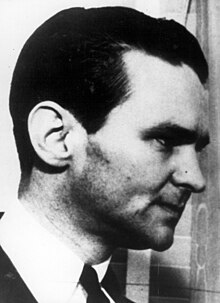Melvin Purvis
| Melvin Purvis | |
|---|---|
 |
|
| Born |
Melvin Horace Purvis II. October 24, 1903 Timmonsville, South Carolina |
| Died | February 29, 1960 (aged 56) Florence, South Carolina |
| Cause of death | Self-inflicted gunshot |
| Resting place | Mount Hope Cemetery |
| Nationality | American |
| Education | University of South Carolina School of Law |
| Employer | FBI |
| Known for | Leading the investigation on the John Dillinger case |
| Spouse(s) | Marie Rosanne Willcox (m. 1931–60) |
| Children | Melvin Horace Purvis III (1940–1986) Philip Alston Willcox Purvis (b. 1943) Christopher Peronneau Purvis (1950–1984) |
Melvin Horace Purvis II. (October 24, 1903 – February 29, 1960) was an American law enforcement official and Federal Bureau of Investigation (FBI) agent. He was given the nickname "Little Mel" because of his short stature. He is noted for leading the manhunts that tracked such outlaws as Baby Face Nelson, Pretty Boy Floyd, and John Dillinger.
Purvis was born in Timmonsville, South Carolina, to Melvin Horace Purvis, Sr. (1869–1938), a tobacco farmer and businessman, and Janie Elizabeth (née Mims, 1874–1927) as the fifth of eight siblings.
Purvis was a well-educated man, and known to be a crack shot. He received his law degree from the University of South Carolina School of Law and had a brief career as a lawyer. Purvis was a member of the Kappa Alpha Order while attending South Carolina. He joined the FBI in 1927 and headed the Division of Investigation offices in Birmingham, Oklahoma City, and Cincinnati. In 1932, he was placed in charge of the Chicago office by Bureau of Investigation Director J. Edgar Hoover. Purvis captured more public enemies than any other agent in FBI history, a record that still stands.
Purvis led the manhunts that tracked outlaws Baby Face Nelson and Pretty Boy Floyd, and most famously John Dillinger, which ended in Chicago on July 22, 1934. However, after Purvis became a media figure for this feat, Hoover claimed that Purvis had been demoted and agent Samuel P. Cowley had been put in charge of the Dillinger case. Cowley was later shot by Baby Face Nelson, and Purvis visited him in the hospital shortly before he died. Purvis was praised for his actions. He reportedly incurred the wrath of Hoover, who had previously supported him, as Purvis sought and achieved publicity for his own role, overshadowing Hoover and the rest of the FBI. In a 2005 book co-authored by Purvis' son Alston, Hoover is portrayed as jealous of the attention given to Purvis after Dillinger was killed.
...
Wikipedia
